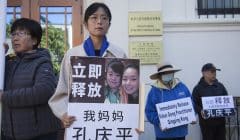Executive Summary and Recommendations
2008 Annual Report
“Persecution cases of Falun Gong prationers across the country have noticeably increased recently, and I think this deserves attention. Freedom of religious belief is being violated even more severely during such a special period [of the Olympic Games], and citizens’ constitutional rights and universal values are under attack in China.”
–Prominent Chinese lawyer Jiang Tianyong, August 2008
“Falun Gong practitioners were at particularly high risk of torture and other ill-treatment in detention… During the year [2007] over 100 Falun Gong practitioners were reported to have died in detention or shortly after release as a result of torture, denial of food or medical treatment, and other forms of ill-treatment.”
–Amnesty International 2008 Annual Report
“The central government intensified its nine-year campaign of persecution against Falun Gong practitioners in the months leading up to the 2008 Beijing Summer Olympic Games… Official accounts of the crackdown were
publicly available on Web sites for all 31 of China’s provincial-level jurisdictions in 2007-2008.”
–Congressional-Executive Commission on China, 2008 Annual Report
The suppression of Falun Gong in mainland China escalated sharply in 2008. A significant body of evidence—including first-hand accounts of adherents, official Chinese government statements and, reliable third party sources—indicate that the escalation was largely made possible by the Beijing Olympics. Chinese officials, under the auspices of “ensuring a smooth Olympics,” utilized the environment of heightened security to arbitrarily detain, torture, and sentence Falun Gong adherents throughout China to re-education through labor camps for up to 2 ½ years or to prison for up to 13 years. (Download full report)
In total, the Falun Dafa Information Center received reports of over 8,000 practitioners having been detained in 2008. Reports of deaths from torture or other abuses in custody continue to flow from China on a nearly daily basis.
As such, those who practice and support Falun Gong inside China continue to be deprived of a wide range of rights guaranteed by the country’s constitution and under China’s international obligations. The following is an abbreviated list of the key developments surrounding Falun Gong inside China in 2008:
Large-scale arbitrary arrests: Thousands of adherents were detained around the country throughout 2008. Most were arrested on the basis of their being known to the authorities as Falun Gong adherents, even if this identity consisted of studying Falun Gong tenets and practicing its meditation exercises in the privacy of their homes. In many cases, adherents were arrested for possessing Falun Gong books and related materials, often after door-to-door searches by security agents. Once detained, the pattern of subjecting adherents to severe torture—including sexual abuse and shocks with electric batons—to force them to disavow their faith remained commonplace.
Increase in sentencing, including to long prison terms: There was an increase in prison and labor camp sentences given to adherents, following unfair judicial proceedings or none at all. Many sentences were handed down towards year’s end after the conclusion of the Olympics and following months of pre-trial detention. Most sentences ranged from one and a half to five years in length, but sentences as long as thirteen years were also recorded.
Over 100 deaths: The Falun Dafa Information Center documented the deaths of 104 adherents in 2008 because of severe abuse or neglect in police custody. During the 16 days of the Olympics alone, ten Falun Gong adherents are confirmed to have died. Additional information pointing to systematic forced organ removal from Falun Gong prisoners of conscience also emerged in 2008, particularly the prevalence of suspicious medical testing.
Nationwide effort: While large numbers of adherents were detained, harassed, and tortured in Beijing and other cities hosting Olympics venues, reports of abuse and official directives to target Falun Gong emerged across the country. According to the Congressional Executive Commission on China (CECC): “Official accounts of the crackdown were publicly available on Web sites for all 31 of China’s provincial-level jurisdictions in 2007-2008.” Indeed, one of the deadliest provinces was Heilongjiang, which hosted no Olympic events.
Role of the 6-10 Office: The 6-10 Office, an extralegal security agency created in 1999 to lead the campaign against Falun Gong, played a central role in prompting and coordinating actions taken against the group in 2008, including monitoring and detentions. According to the CECC, in April, the central 6-10 office issued “an internal directive to local governments nationwide mandating propaganda activities” against Falun Gong.
Defense lawyers harassed: Throughout the year, a small group of approximately 20 lawyers continued to defend Falun Gong adherents, despite Party directives banning such action. On repeated occasions in 2008, lawyers defended practitioners in court, presenting detailed arguments as to their innocence and the broader need to observe the constitutional guarantee of freedom of religion. In all cases, the adherents were sentenced anyway, and many of the lawyers known to represent Falun Gong adherents and take other sensitive cases continued to face harassment, monitoring, disbarment, and even detention or torture at the hands of the authorities.
Media and Internet taboo: Falun Gong remained one of the most taboo topics of coverage for both Chinese and foreign news organizations reporting from China in 2008. The pre-Olympic crackdown included the detention and sentencing of adherents found to be possessing, producing, or distributing underground leaflets in accordance with their right to freedom of expression. Throughout the year, Falun Gong and related websites remained among the most systematically and hermetically blocked by China’s Great Firewall, including during the Olympics.
Despite the ongoing violence by the authorities, 2008 also saw some encouraging developments on the part of the international community and certain segments of Chinese society. In response to the violence used against adherents, Amnesty International published urgent actions on behalf of individual practitioners at risk of torture, while the UN Committee Against Torture issued a binding decision calling for an independent investigation into abuse of Falun Gong adherents in custody. Following letter-writing campaigns from Western government officials and ordinary citizens around the world, two adherents with relatives in the United States were freed from detention. Within China, as mentioned above, the trend that began in recent years of prominent lawyers increasingly willing to take a public stand on behalf of Falun Gong adherents continued.
One of the key reasons for both the ongoing ferocity of the campaign and the increased support from society would appear to be adherents’ continued ability to distribute at a grassroots level large amounts of printed materials disclosing details of the persecution as well as the CCP’s crimes against its citizens more broadly. Thus, while some observers have cited the Party’s efforts to silence dissent surrounding the Olympics as the primary cause for the 2008 crackdown, this does not seem to fully explain the measures taken against Falun Gong adherents. Given the trend of sentencing those arrested during the pre-Olympic period to terms stretching forward several years, it would appear rather that the Party seized on the need to hold a “safe” Olympics as a means to further advance the near decade-long persecutory campaign, limit the distribution of information deemed threatening to its rule, and move closer to the aim of “eradicating Falun Gong.”
Given the above findings, the Falun Dafa Information Center makes the following recommendations to the international community:
Governments must ensure engagement does not yield grave human costs: Nations should do a thorough review of their engagement with the current Chinese regime and ensure that no policies facilitate or serve as a catalyst for Chinese officials to further the suppression of Falun Gong. The findings of this report show that the CCP will use opportunities like the Olympics to advance its agenda of wiping out Falun Gong.
Governments and NGOs must ensure Falun Gong remains a key component of any legitimate discourse on or action concerning human rights in China. Falun Gong adherents remain the largest population of prisoners of conscience in China today. The CCP’s absolute position of not reversing its policy to persecute Falun Gong cannot be permitted to generate an exception to advancing the rights of a large segment of Chinese citizens. To do so, would be to allow the CCP to dictate the terms of human rights policy.
Other countries should offer protection to Falun Gong refugees: Governments must ensure their mechanisms for receiving and providing safe harbor to victims of religious persecution are made fully available to Falun Gong practitioners. This report clearly shows the danger Falun Gong adherents face in China, including those who practice their beliefs in the privacy of their own homes. Several of those tortured to death in 2008 were individuals originally detained not for any action they took, but merely for being identified as a Falun Gong adherent.
Human rights workers should pursue all possible avenues of investigation into the persecution, which have grown steadily in recent months. Notably, Chinese lawyers in growing numbers are publicly defending Falun Gong in Chinese courts and often attest to the abuses suffered by their clients.
Mainstream media should investigate and report on the Falun Gong story, which transcends the plight of Falun Gong practitioners themselves, shedding important light on the broader conditions of life in modern China, its people and its influence on the international community. Most media missed several critical stories surrounding the Olympics-related mass arrests and detention of Falun Gong adherents, and what they meant for the direction of the modern Chinese state.
Full complete 2008 Annual Report






